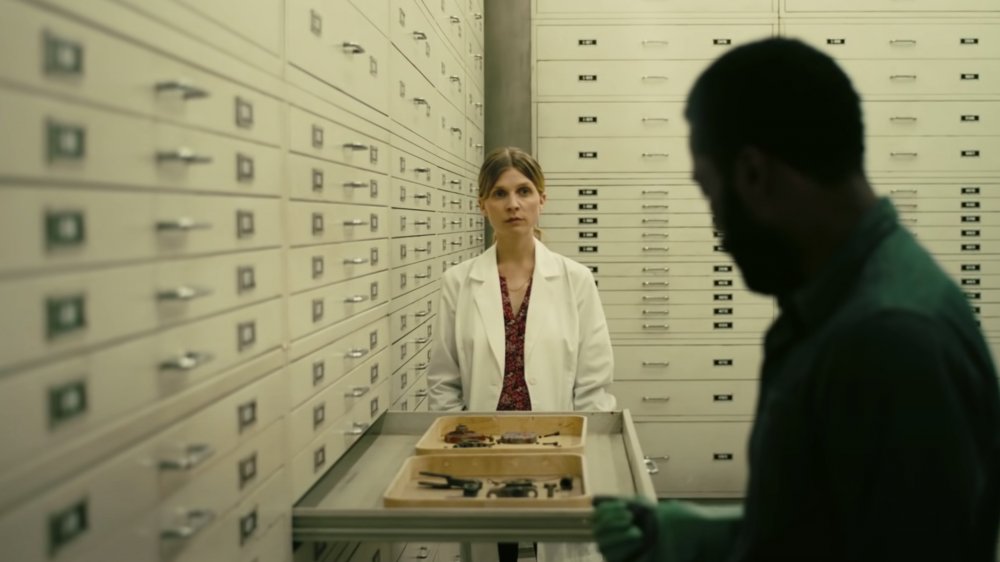Here's How The Time Inversion In Tenet Really Works
Time, as the old idiom states, marches forward, unless you happen to be appearing in Christopher Nolan's new film, Tenet. Various scientists have helped break down the movie's wild mechanics and presented it to us in a form that us simple folk can understand, as appears to be the necessary approach whenever we get another film from the mind of Nolan.
In Tenet, there is a puzzling new concept called 'time inversion.' Our first instinct is to think that it is a unique approach to time travel, but a deeper dive proves that to be far from the truth. Despite how the science that it's based on reads, it's not as complicated as you think. Well, we take that back — it IS complicated, because it's Christopher Nolan and the guy feeds on twisting our collective brains into pretzel knots and then adding salt. Strap in, because we're about to redline all the engines, slam things into reverse, and break down how the time inversion in Tenet really works.
Christopher Nolan uses scientists to ground his ideas in reality
One of the perks of being a big-time Hollywood director is that you have the money and clout to bring in some of the smartest people on the planet. On the set of Tenet, Nolan had a consultant in the form of Kip Thorne, a Nobel Prize-winning theoretical physicist and consultant on the set of the director's last temporal outing, Interstellar. Nolan stated in an interview with Esquire, "Kip Thorne read the script and he helped me out with some of the concepts, though we're not going to make any case for this being scientifically accurate. But it is based roughly on actual science."
One of the reality-based concepts used to ground the whole time inversion thing is entropy (Strap on your thinking caps). So, think about when you place two objects together, one hot and one cold. Eventually those two objects will balance out and reach the same temperature (one will decrease in temperature, while the other increases), reaching equilibrium. Entropy is the measurement of that journey towards equilibrium. According to the second law of thermodynamics, entropy can never decrease — it can only increase or stay the same. Our perception of entropy affects how we view time and why we see it flowing in one direction.
So, Nolan thought, what if you could actually reverse that entropy? This would affect your perception of time, itself. Even then, all of time itself cannot be inverted with this theory, but you can invert people and objects. Thus, we are given the giant metal turnstiles in Tenet that invert whatever passes through them. Once inverted, these objects are moving backwards against the flow of time, as if they are stepping upstream through a river. The important distinction of time inversion sets the film apart from time travel movies and introduces an entirely new storytelling device.
Time inversion sidesteps the usual paradoxes of time travel
In time travel films, people are able to immediately jump to a certain point in the past or future. This is not the case in Tenet. People who are inverted have to live life backwards in order to get to a certain point. So, in order to travel to a week ago, you have to actually live that whole week in reverse. Time inversion is what allows the characters to do that, and they can do it with other stuff as well, like guns. The concept sidesteps the typical paradoxes that occur with time travel stories, because the stuff happening in reverse happens as everything else is moving forward. So, everything that happens has happened already — cause and effect are still permanent. We know, our brains are cramping up too.
The main character in Tenet is The Protagonist (played by John David Washington), and he's working with a group of super spies to stop World War III. The main baddie (Kenneth Branagh) is working with future saboteurs to send back weapons and other bad guys in an attempt to unleash a doomsday device. How are you supposed to fight back against villains that are flying past you into the past? Therein lies the appeal of an entirely new spy thriller. Even without fully grasping the concepts involved, it's an immensely enjoyable experience. Car chases and gun fights flying across the screen both forwards AND backwards through time!? Tenet makes us want to slap on a hazmat suit, head to the theaters, and find out how to return to last year.


